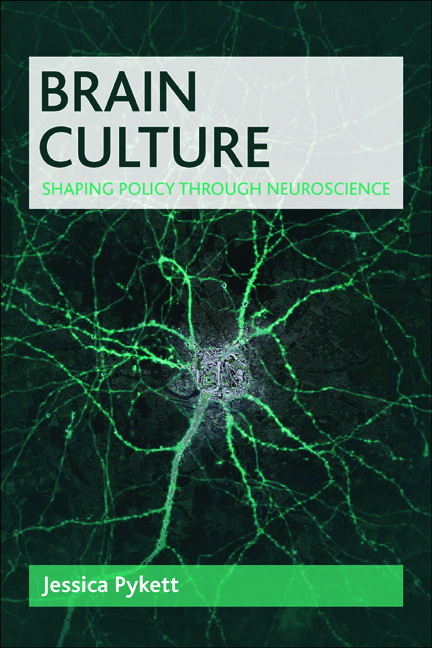Book contents
- Frontmatter
- Dedication
- Contents
- About the author
- Acknowledgements
- Preface
- One Introduction: governing through brain culture
- two Brain culture in context
- three Designing cerebral cities
- four Teaching the learning brain
- five Managing workplace emotions
- six Conclusion: what is at stake in the brain world?
- References
- Index
Preface
Published online by Cambridge University Press: 10 March 2022
- Frontmatter
- Dedication
- Contents
- About the author
- Acknowledgements
- Preface
- One Introduction: governing through brain culture
- two Brain culture in context
- three Designing cerebral cities
- four Teaching the learning brain
- five Managing workplace emotions
- six Conclusion: what is at stake in the brain world?
- References
- Index
Summary
The European Commission's €1.2 billion Human Brain Project and President Barack Obama's BRAIN initiative attest to contemporary governmental ambitions to uncover the mysteries of the brain, to break through new frontiers of knowledge, and to determine the brain's impact on human behaviour. These efforts to map the brain, to capitalise on the vast datasets emerging from contemporary neuroscience, and eventually to develop the computing power to simulate neural functioning are the latest indications of a culture in which the brain is privileged in its explanatory power for all manner of human experiences, decisions, capabilities, actions and relationships.
This book is about the effects of this brain culture on the governance of citizens in the UK. It outlines several social spheres in which the neurosciences, psychological and behavioural sciences inform policy and practice. It examines academic disciplines and modes of understanding which have themselves been informed by a ‘neural turn’. While brain culture is not new, the book considers its current manifestations. It explores the intersections of political, economic and social practice with specific brain claims and brain-based activities. The central assertion is that this brain culture can only be understood in a specific geohistorical context – the context of the brain world. There is a circularity inherent in this assertion which poses a significant challenge to both neuroscientific attempts to know the biophysical brain, and to social scientific, arts and humanities research that sets out to comprehend brain culture.
Human geography is one disciplinary approach that should enable us to better understand the brain world, since it has long been concerned with the relationship between humans and the world, situated behaviours and spatial context. Arguably impeded by its own neural turn, and by technocratic and instrumentalised forms of knowledge, there is a need to preserve a distinctly human geographical account of the ‘psycho-spatial’ to offer an alternative to the potential reductionism, determinism and medicalisation of brain culture. This account treats the person as having a thinking mind embedded in a particular social space and era. It approaches the drivers of behaviour as at once embodied and discursive, but challenges the privileging of scientific accounts of the brain as a body part somewhat divorced from the world.
- Type
- Chapter
- Information
- Brain CultureShaping Policy through Neuroscience, pp. ix - xPublisher: Bristol University PressPrint publication year: 2015



